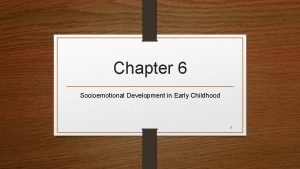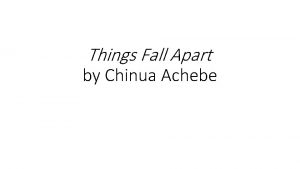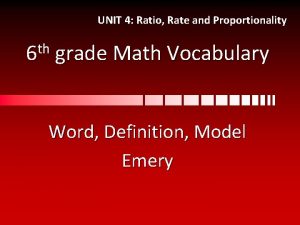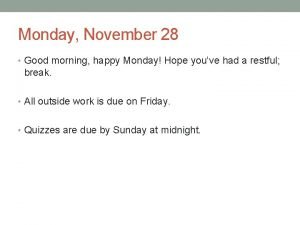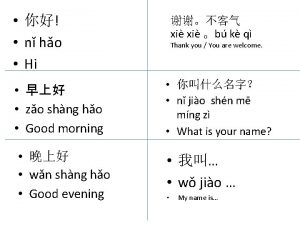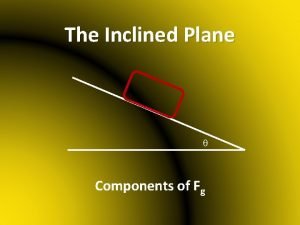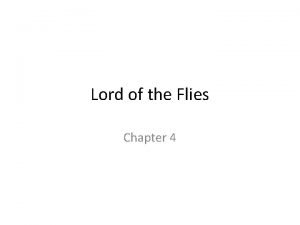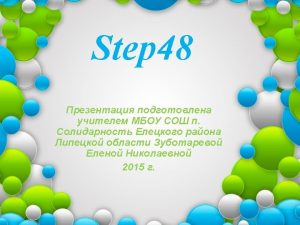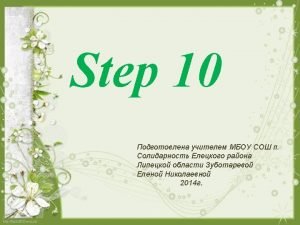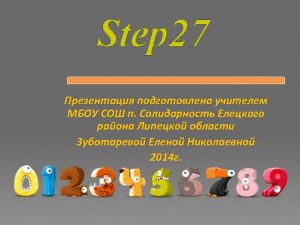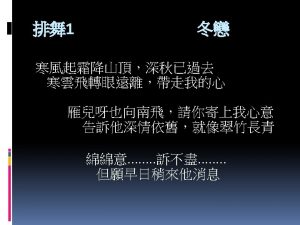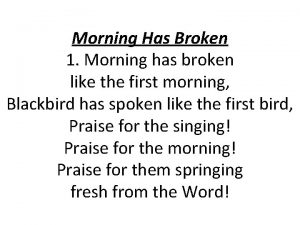zo early vs zoshng early morning shngwlater part


















































- Slides: 50


zǎo early 早 早早上 vs. 上午 • 早上 zǎoshàng early morning • 上午 shàngwǔ--》later part of morning 早!(most common greeting for “good morning!) 早安!&早上好!--》more formal and less common greeting for “good morning” Translate the times using the right word: 8 a. m. ; 10 am; 4 pm; 7 pm 早上八点; 上午十点; 下午4点; 晚上七点




How do you say this in Chinese?










dà jiā everybody 大家 大家好! Greetings to all; Hello, everyone







kù cool 酷 This word came from English word “cool”. 你覺得誰很酷? 你觉得谁很酷?






Speaking Exercises Workbook on p. 119, II. A. 1. Why did Bai Ying’ai come so late today? 為什麼白英愛今天來得這麼晚? 为什么白英爱今天来得这么晚? 2. Why was Li You able to go to bed early last night? 為什麼李友昨天晚上睡得早? 为什么李友昨天晚上睡得早?



II speaking Exercise part B on workbook p. 119 Ask your classmate the following: 1. Are you late (or early) for class today? 你今天來得晚(早)嗎? 你今天来得晚(早)吗? 2. Did you go to bed early (or late) last night? 你昨天睡得早嗎? 你昨天晚上睡得早吗? 3. Did you prepare for today’s lesson? 今天的課你準備了嗎? 今天的课你准备了吗?

https: //www. youtube. com/watch? v= PWu. Me 8 tf_38 文房四寶 文房四宝:Four the Study Treasures in


怎么a. How to V b. How come!? Why?你怎麼 1 st meaning: 怎麼+V: How to write my Chinese name? V 怎麼寫我的中文名字? 2 nd meaning: 怎麼 How come? Why? How come you did not come yesterday? 你昨天怎麼沒(有)來?


怎么+V : b. How; How come?In Questions It is often used to ask about the reason or the cause of an action. It is usually used for a special reason. 平常: 12: 00 来学校;今天 10: 30来。 —>你今天_____来得这么___? 平常:做功课; 今天没做功课 —>你今天_____没做功课?

怎麼 怎么 跟你的同学一起练习 Practice Textbook on 193 with your classmate.

1. 明天有考試【试】, 2. how come /why how come/ why not didn’t you do your review? homework? 3. 我們 8: 00才上課 【我们 8: 00才上课】, why did you come at 7: 00 ? 4. 昨天是小高的生日, why did his girlfriend not come? 5. 今天的小考很容易, 6. 今天星期二, how come you did so come you didn’t go to poorly in your test? the Chinese class?




才 vs. 就 and 就 indicate whether something takes place later or sooner than expected. 1. I went to bed at 8 p. m. last night. 我昨天晚上八點就去睡覺。 我昨天晚上八点就去睡觉! 才 2. But this morning I ate my breakfast at 11: 00 p. m. 但是我今天上午十一點才吃早飯。 但是我今天上午十一点才吃早饭。

Adv. 就 and 才+VERB Q 1: What is 就+V? sooner or earlier than usual or expected Q 2: What is 才+V? later than expected Please insert “就””才”into the sentences: 我昨天晚上九点___睡觉。他半夜(bànyè)两点 __睡觉。 Q: 老师您上午有空吗? A:我下午四点以后____有空。




Do language practice F. 才 vs. 就 ( With your classmate. (Textbook on. P. 193, do 1, 3, 5) Do Language Practice G (Textbook 195, do 1, 3, 5) on p.

Descriptive Complement: S+(V)+ O +V 得+很/不+Adj Q 1: When do you use得? describe how an action is done—for example, how well/fast it is done. Q 2: Can you use “了” with 得? No Make sentence 他/平常/說話/很快 他/ 平常/ 說話/ 很快。 他/上個星期/考試/很好。 他/ 上个星期/ 考试/ 很好。

 Brother john lyrics
Brother john lyrics Responses to hello
Responses to hello Good morning message to my lecturer
Good morning message to my lecturer Buenos afternoon
Buenos afternoon Nobody loves me poem
Nobody loves me poem Good morning everybody
Good morning everybody Good morning, class!
Good morning, class! Hello friend! i am glad to see you!
Hello friend! i am glad to see you! Jerome 6 and hani 10 get up early on saturday morning
Jerome 6 and hani 10 get up early on saturday morning I got up early one morning and rushed into the day
I got up early one morning and rushed into the day Lame maatla kenalemang
Lame maatla kenalemang Early cpr and early defibrillation can: *
Early cpr and early defibrillation can: * Part to part ratio definition
Part to part ratio definition Part to part variation
Part to part variation What is a technical description?
What is a technical description? Brainpop ratios
Brainpop ratios The parts
The parts Part whole model subtraction
Part whole model subtraction The part of a shadow surrounding the darkest part
The part of a shadow surrounding the darkest part Good afternoon teacher
Good afternoon teacher Saturday morning prayer
Saturday morning prayer Anatomy of long morning
Anatomy of long morning Cassiestephens.blogspot.com behind my mask
Cassiestephens.blogspot.com behind my mask Can you greet me every morning
Can you greet me every morning Tuesday morning prayer
Tuesday morning prayer Expression of leave taking
Expression of leave taking Good morning peacock
Good morning peacock Thank you good morning
Thank you good morning Good morning team
Good morning team Monday morning prayer
Monday morning prayer Good morning campers who can make me hard
Good morning campers who can make me hard Good morning val
Good morning val Language
Language Good morning everyone
Good morning everyone Morning to you song
Morning to you song Hi good morning teacher
Hi good morning teacher Happy monday november
Happy monday november Good morning grammar
Good morning grammar Ho hi good morning
Ho hi good morning Force components on inclined plane
Force components on inclined plane A rainbow in the morning is the sailor's warning
A rainbow in the morning is the sailor's warning Morning ladies and gentlemen
Morning ladies and gentlemen Dej dentistry
Dej dentistry Good morning dear students poem
Good morning dear students poem Apetii
Apetii Morning prayer in school
Morning prayer in school Starter of the day activity soda morning soft start
Starter of the day activity soda morning soft start Morning meeting lesson plan
Morning meeting lesson plan Good morning images with safety
Good morning images with safety Lord of the flies annotations chapter 4
Lord of the flies annotations chapter 4 Good morning unit 1
Good morning unit 1








